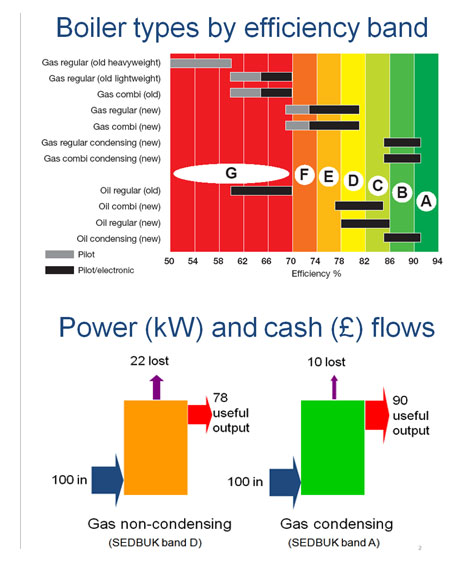
Energy Efficient Gas Boilers
Always use a GAS SAFE registered engineer Click here for further information

Boilers have changed considerably over recent years with typical efficiencies increasing into the high 90%'s. Known as condensing or high efficiency boilers these will help reduce fuel consumption and provide the householder with substantial savings compared to standard efficiency products that have been installed a number of years ago.
Condensing boilers have become an increasingly important choice in the UK to meet the current legislative requirements for boiler efficiency.
Gas-fired condensing boilers offer significantly higher efficiencies than can be achieved from non condensing boilers.
Condensing boilers offer tangible benefits by:
- Reducing carbon dioxide emissions and helping to combat global warming.
- Improving household efficiency thus reducing fuel bills.
Condensing boilers work on the principle of recovering as much as possible of the waste heat which is normally ejected to the atmosphere from the flue of a conventional (non-condensing) boiler.
This is accomplished by using an extra-large heat exchanger SEDBUK 'A' rated or sometimes two heat exchangers ( normally SEBUK 'B' rated) within the boiler which maximises heat transfer from the burner as well as recovering useful heat which would normally be lost with the flue gases. Typically a condensing gas boiler would have seasonal efficiency of 88% compared with a non-condensing boiler at 75% and some older type boilers at 55-60%.
When in condensing mode (for condensing boilers do not condense all the time) the flue gases give up their 'latent heat' which is then recovered by the heat exchanger within the boiler.
As a result the temperature of the gases exiting the flue of a condensing boiler is typically 50-60°C compared with 120-180°C in a current non-condensing boiler. At the same time an amount of water or 'condensate' is produced.
A condensing boiler will always have a better operating efficiency than a conventional non-condensing one, due to its larger and more efficient heat exchanger. They are available as both regular and combi boilers versions.
Regular boilers
This is the name given to boilers which are not combination boilers. Historically, they were the most commonly specified boiler and referred to as conventional or traditional units.
All regular boilers are capable of providing space heating directly but require connection to a separate hot-water storage system since they do not have the capability to provide domestic hot water directly.
Regular boilers for sealed systems which have components such as pumps, expansion vessels, etc, within the boiler casing are known as system boilers
Combi boilers
Combination (combi) boilers provide both space heating and direct domestic hot water. The most common type of unit is the instantaneous combi boiler, which heats water on demand without maintaining an internal store of water already heated.
The units are capable of providing hot water continuously, but at a lower flow rate than could be expected from typical hot water storage systems. Therefore, these appliances may be less suitable for dwellings where multiple simultaneous draw-offs from separate taps are likely, ie multi-bathroom/shower room dwellings, although a number of high output or storage combi's are now available to overcome this problem with some delivering up to 18 litres per minute of hot water.
Combi boilers will save space because:
- They are fed directly from the water mains supply, and there is no need for a hot water storage cylinder or cistern to feed it
- They are usually intended for use in a sealed system and so do not need a feed and expansion cistern, giving the opportunity to have a 'dry' roof space.
Before selecting a combi boiler it is important to ensure that the dwelling has satisfactory water pressure and an adequate water pipe size to prevent the possibility of inadequate hot water performance.





